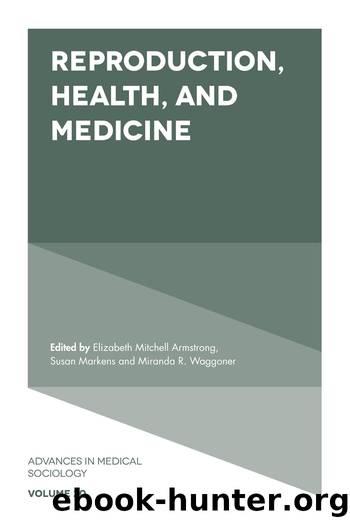Reproduction, Health, and Medicine by Mitchell Armstrong Elizabeth;Markens Susan;Waggoner Miranda R.;

Author:Mitchell Armstrong, Elizabeth;Markens, Susan;Waggoner, Miranda R.;
Language: eng
Format: epub
Publisher: Emerald Publishing Limited
Published: 2019-10-11T00:00:00+00:00
Endorsing the Generational Disconnect
Within my sample, only white, highly educated pregnant women and their mothers described their relationships in ways consistent the generational disconnect: these pregnant women pursued medical surveillance and guidance about pregnancy health behaviors from clinicians, books, or the Internet. Liz, the artist, rated her doctor as the person from whom she would most likely seek advice, and described her mother, Janice, as unfamiliar with most of the tests and medical procedures Liz underwent during her first pregnancy. This divide was apparent even before the pregnancy: Liz and her domestic partner Rose required medical assistance, including three rounds of in-vitro fertilization, in order to conceive. Janice declared to me that she found the information necessary to understand these fertility procedures âbewilderingâ and âoverwhelming.â Janiceâs sense of illiteracy persisted through Lizâs pregnancy: Janice felt âcompletely unqualifiedâ to advise on Lizâs doctorâs appointments; Liz agreed with Janiceâs assessment. Yet, as I have shown above, Liz described her mother as a âbig helpâ in arbitrating her pregnancy symptoms, just as nearly all of the women I interviewed relied upon their mothers to assess their embodied experiences. Further, Janiceâs bewilderment did not prevent her from directing Liz to seek medical care, suggesting that the (limited) disconnect need not result in opposition to medicalization.
Similarly, Catherine, the lawyer who drew parallels between the ways she and Judith carried their pregnancies, made it clear that Judithâs advice about her health behaviors in pregnancy was not welcome. In one example, Catherine, a marathoner, had decided to modify her workouts only slightly during the first half of her first pregnancy, based on conversations with her doctor and her own research. Judith suggested that this regimen was excessive, as Catherine described:
My own mother thinks the jolting may cause a miscarriage. The woman had four children. I know for a fact that she was far less attentive to her body during pregnancy than I am, not only in diet and of course smoking, but also sleep and overall health and attention to strain, especially when she was chasing after the rest of us [â¦] The general understanding [of medical professionals] is that women should not begin intensive exercise during pregnancy; if you are already exercising and there are no indications of a problem, then exercise in moderation is a very good thing.
Catherine here invokes two dimensions of the generational disconnect: that Judith was uninformed about how pregnancy really worked (that âjoltingâ would dislodge an established early pregnancy) and that Judith could not effectively recall the exercise (or other, now discredited, practices) to which she had unintentionally exposed her own children. Catherine outlined what she understood to be the medical consensus on the advisability of her practice, invoking it as the definitive guide.
Trish, a Manhattanite pregnant for the first time, similarly illustrates the larger pattern of white, highly educated women emphasizing medical advice about their pregnancy behaviors over the recommendations of their mothers. Trish planned to fly across the country in her third trimester for a friendâs wedding. Her mother,
Download
This site does not store any files on its server. We only index and link to content provided by other sites. Please contact the content providers to delete copyright contents if any and email us, we'll remove relevant links or contents immediately.
Human Diseases (MindTap Course List) (by Team-IRA) by Marianne Neighbors Ruth Tannehill-Jones(794)
The Neglected Dimension of Global Security: A Framework to Counter Infectious Disease Crises by National Academy of Medicine Secretariat(405)
Statistical Methods in Health Disparity Research by J. Sunil Rao(388)
Imaging in Urology by Mitchell Tublin MD Joel B Nelson MD(377)
Short Course in Medical Terminology by Nath Judi L.;(321)
Wilkins' Clinical Practice of the Dental Hygienist by Boyd Linda D.;Mallonee Lisa F.; & Lisa F. Mallonee(289)
Clinical Research in Occupational Therapy, Sixth Edition by Martin Rice;(287)
Murray's Basic Medical Microbiology E-Book by Murray Patrick R.;(271)
Anatomical Kinesiology by Gross Michael;(269)
Psychedelics As Psychiatric Medications by Nutt David;Castle David;(260)
Neuroscience Fundamentals for Rehabilitation by Lundy-Ekman Laurie(258)
Public Health and Society: Current Issues by Burke Lillian D.;Weill Barbara;(239)
Health Behavior: Theory, Research, and Practice by Karen Glanz & Barbara K. Rimer & K. Viswanath(239)
The Handbook of Medicinal Chemistry by Simon E Ward;Andrew Davis;(235)
Rang & Dale's Pharmacology 9th Edition plus Flashcards 2nd Edition by Unknown(228)
Cancer Cell Culture by Unknown(226)
Primary Care Occupational Therapy by Unknown(224)
Brown's Evidence-Based Nursing: the Research-Practice Connection by Nowak Emily W.;Colsch Renee; & Renee Colsch(222)
The Politics of Reproduction in Ottoman Society, 1838â1900 by Gülhan Balsoy(220)
